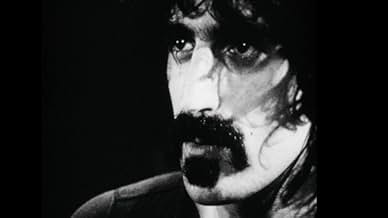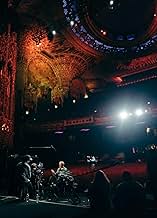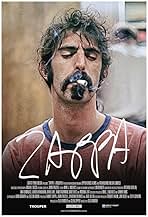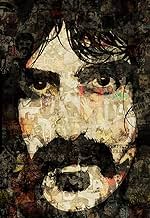IMDb RATING
7.5/10
3.9K
YOUR RATING
An in-depth look into the life and work of musician Frank Zappa.An in-depth look into the life and work of musician Frank Zappa.An in-depth look into the life and work of musician Frank Zappa.
- Awards
- 5 nominations total
Frank Zappa
- Self
- (archive footage)
Lonnie Lardner
- Self - Newscaster for Action News
- (archive footage)
Patrice Zappa
- Self - Frank Zappa's Sister
- (archive footage)
Carl Zappa
- Self - Frank Zappa's Brother
- (archive footage)
Rose Zappa
- Self - Frank Zappa's Mother
- (archive footage)
Francis Zappa
- Self - Frank Zappa's Father
- (archive footage)
Edgard Varèse
- Self
- (archive footage)
Don Van Vliet
- Self
- (archive footage)
- (as Captain Beefheart)
Frank Zappa and the Mothers of Invention
- Themselves
- (archive footage)
Johnny 'Guitar' Watson
- Self
- (archive footage)
The Beatles
- Themselves
- (archive footage)
Tom Wilson
- Self - Music Producer
- (archive footage)
Euclid James 'Motorhead' Sherwood
- Self - Baritone Saxophone
- (archive footage)
- (as Motorhead Sherwood)
- …
Featured reviews
This film was interesting in a lot of ways but there seemed to be large portions of Frank's life missing here...the focus really concentrated on FZ as the composer and the early beginnings through the Mothers...after the Mothers disbanded there seemed to be a large gap and fast forward to his final performance as a composer with the final notes stating he released 62 albums......would have been nice to at least walk through the 70's and 80's a bit more than the Warner Bros. Release fiasco and the Senate hearings.....ohhh well...worth a watch for content otherwise not seen....
I was expecting all sorts of over-the-top freaky posturing and interviews for the sake of a buck, which Frank would have despised. Instead it was a decent and accurate synopsis of a man who will forever be shrouded in mystery.
The impact Frank Zappa had on many generations of slowly aging young persons coming of age, listening to FZ albums and never being the same again, seems to be the point of this documentary.
I was impressed through the whole thing. The production was never sensationalist. It is a somewhat gripping bio of a man finding his way as an artist. I think they call themselves "influencers" now.
The impact Frank Zappa had on many generations of slowly aging young persons coming of age, listening to FZ albums and never being the same again, seems to be the point of this documentary.
I was impressed through the whole thing. The production was never sensationalist. It is a somewhat gripping bio of a man finding his way as an artist. I think they call themselves "influencers" now.
Greetings again from the darkness. Frank Zappa's music was never considered mainstream. His songs were rarely played on the radio. In his entire career, he charted one Top 40 song, and that was driven by his daughter. To some, he was known as a political activist and a spokesperson first, and a musician second. At times he was an enigma and a rebel or maverick, and he's even described as trying not to write a hit song. Alex Winter may be best known as Bill in the "Bill and Ted" movies, and he's also a successful documentary filmmaker (DEEP WEB, 2015). This time out he turns his focus on the career and life of Frank Zappa.
One of the first things we see is Frank Zappa taking us on a tour of his personal vault located at his Laurel Canyon home. It's an enormous private collection that captures quite a bit of history from the 1960's forward. Zappa points out some of his favorites including his jams with Eric Clapton in the basement and music with his friend Captain Beefheart (Don Van Vliet). These are original masters of Zappa's work over the decades, and he was nothing if not prolific, releasing 62 albums during his career, and another 53 following his death in 1993.
Acting as bookends for the film are clips of Zappa's 1991 live show in Prague, where he is helping celebrate the withdrawal of Russian troops. It's also his last guitar performance on stage. An incredible amount of footage exists of Zappa pontificating on one subject or another, sometimes on television, sometimes in front of news cameras, and even in front of a Senate committee. His music and his life was usually focused on social commentary, opinions not always popular with the establishment.
It's very interesting to hear Zappa talk about his early influences, particularly how he never outgrew his love for editing - something that began with the 8mm films at his childhood homes. He didn't begin playing music until his early teenage years, and it was orchestral before rock. He always considered himself a composer, and what a prolific writer he was. It's an unusual film in that it not only tracks the timeline of his career, but we are privileged to hear Zappa's opinions directly from him thanks to the unending recordings and archival footage available.
Mr. Winter includes much more than Zappa. We hear from musicians that made up the Mothers of Invention, including Steve Vai, Bunk Gardner, Ian Underwood, and an emotional Ruth Underwood. We also hear from renowned Rock n Roll groupie Pamela Des Barres, and Frank's wife Gail. It's noted that Zappa disbanded the Mothers of Invention in 1969, and there were many iterations that played afterwards. Some of the prominent names included violinist Jean Luc Ponty, and Howard Kaylan and Marc Volman of The Turtles fame. There is even a terrific clip of John Lennon and Yoko Ono performing on stage with Zappa and his band ... shocking for anyone not familiar with Yoko's infamous primal screams.
One of the best stories included is how Zappa's biggest hit came to be. A note from his young daughter, Moon Unit, introducing herself to her frequently absent father led to a collaboration on the single "Valley Girl", which cracked the Top 40. There are also stories on his dreaded hosting of "Saturday Night Live", as well as pieces on the Kronos Quartet, London Symphony Orchestra, and Ensemble Modern performing his music. In 1979, Zappa became the first musician to go completely independent with his own label, and this is only a few years after he was seriously injured by being attacked on stage.
Some may recall Zappa's appearance in front of the Senate committee in regards to the drive to include Parental warning labels on published music. Zappa viewed this as nothing more than censorship, and he was one of the few musicians to fight the battle against the opponents led by the wife of White House Chief of Staff James Baker. Zappa was certainly a man of principles, and had no time for those who weren't. It was pancreatic cancer that took his life, but a life well lived it was. His time as a symbol of freedom in Czechoslovakia is proof that he never shied away from standing up for what he believed in. So like his music or not - he surely didn't care. But he respected those who cared for society and freedom. Filmmaker Winter does a nice job with a two hour run time, when the material exists for a 4 part series.
One of the first things we see is Frank Zappa taking us on a tour of his personal vault located at his Laurel Canyon home. It's an enormous private collection that captures quite a bit of history from the 1960's forward. Zappa points out some of his favorites including his jams with Eric Clapton in the basement and music with his friend Captain Beefheart (Don Van Vliet). These are original masters of Zappa's work over the decades, and he was nothing if not prolific, releasing 62 albums during his career, and another 53 following his death in 1993.
Acting as bookends for the film are clips of Zappa's 1991 live show in Prague, where he is helping celebrate the withdrawal of Russian troops. It's also his last guitar performance on stage. An incredible amount of footage exists of Zappa pontificating on one subject or another, sometimes on television, sometimes in front of news cameras, and even in front of a Senate committee. His music and his life was usually focused on social commentary, opinions not always popular with the establishment.
It's very interesting to hear Zappa talk about his early influences, particularly how he never outgrew his love for editing - something that began with the 8mm films at his childhood homes. He didn't begin playing music until his early teenage years, and it was orchestral before rock. He always considered himself a composer, and what a prolific writer he was. It's an unusual film in that it not only tracks the timeline of his career, but we are privileged to hear Zappa's opinions directly from him thanks to the unending recordings and archival footage available.
Mr. Winter includes much more than Zappa. We hear from musicians that made up the Mothers of Invention, including Steve Vai, Bunk Gardner, Ian Underwood, and an emotional Ruth Underwood. We also hear from renowned Rock n Roll groupie Pamela Des Barres, and Frank's wife Gail. It's noted that Zappa disbanded the Mothers of Invention in 1969, and there were many iterations that played afterwards. Some of the prominent names included violinist Jean Luc Ponty, and Howard Kaylan and Marc Volman of The Turtles fame. There is even a terrific clip of John Lennon and Yoko Ono performing on stage with Zappa and his band ... shocking for anyone not familiar with Yoko's infamous primal screams.
One of the best stories included is how Zappa's biggest hit came to be. A note from his young daughter, Moon Unit, introducing herself to her frequently absent father led to a collaboration on the single "Valley Girl", which cracked the Top 40. There are also stories on his dreaded hosting of "Saturday Night Live", as well as pieces on the Kronos Quartet, London Symphony Orchestra, and Ensemble Modern performing his music. In 1979, Zappa became the first musician to go completely independent with his own label, and this is only a few years after he was seriously injured by being attacked on stage.
Some may recall Zappa's appearance in front of the Senate committee in regards to the drive to include Parental warning labels on published music. Zappa viewed this as nothing more than censorship, and he was one of the few musicians to fight the battle against the opponents led by the wife of White House Chief of Staff James Baker. Zappa was certainly a man of principles, and had no time for those who weren't. It was pancreatic cancer that took his life, but a life well lived it was. His time as a symbol of freedom in Czechoslovakia is proof that he never shied away from standing up for what he believed in. So like his music or not - he surely didn't care. But he respected those who cared for society and freedom. Filmmaker Winter does a nice job with a two hour run time, when the material exists for a 4 part series.
Frank Zappa was a unique and extremely talented composer and producer, with a sharp mind and a lovely dark sense of humour. I was quite the fan as a young man and have seen him in concert on several occasions. His death at only 52 came too soon, the body of work he managed to produce in such a short life defies belief.
However this documentary falls flat in showing this brilliance. Most of the material showing Frank is not new, the added interviews don't add much as everything has basically been said before. The editing is messy, jumping around timeperiods without a rhythm or arc. It struck me that Moon and Dweezil weren't interviewed, but when I saw that Ahmet was a producer it made sense; unfortunately Zappa's children have fallen out so they probably weren't asked or interested.
Zappa was great, but most of the stuff that came out after his death, including documentaries, is missing the quality that made his work so special. If you like FZ, listen to his music. I you want visual stimulation, just watch the things he made himself, it will tell you al you need to know about the man. Or read The Real Frank Zappa Book.
However this documentary falls flat in showing this brilliance. Most of the material showing Frank is not new, the added interviews don't add much as everything has basically been said before. The editing is messy, jumping around timeperiods without a rhythm or arc. It struck me that Moon and Dweezil weren't interviewed, but when I saw that Ahmet was a producer it made sense; unfortunately Zappa's children have fallen out so they probably weren't asked or interested.
Zappa was great, but most of the stuff that came out after his death, including documentaries, is missing the quality that made his work so special. If you like FZ, listen to his music. I you want visual stimulation, just watch the things he made himself, it will tell you al you need to know about the man. Or read The Real Frank Zappa Book.
I gave this my own title because I feel that was the focus. And it's very well done! This movie gives you the full spectrum of Frank Zappa. It doesn't sugar coat the subject. While showing his brilliance it shows his flaws. The parts dealing with his end of life can be very emotional as it should be. Considering the vast volume of source material I was hoping for more of the Garrick Theater era, but it wasn't to be. Perhaps it's not available. Maybe some longer clips of concert material too. But it isn't that type of film. Hopefully everyone will see just how talented and driven Frank Zappa is from watching this. Alex Winter does a great job of showing his talent as a composer. Only lacking in showing what a proficient guitar player he was. Never really emphasized how ground breaking he was in that area. I still highly recommend seeing the movie!
Did you know
- TriviaThe film was not financed by crowdfunding, contrary to popular belief. The Kickstarter campaign was aimed solely at preserving and restoring the contents of the Zappa vault. The film that resulted from that preservation was itself financed by conventional backers.
- GoofsIn the opening titles, it says, Zappa played a concert in the Czech Republic on 24 June 1991, to celebrate the fairly recent departure of Russian troops. It was in fact still Czechoslovakia then.
It then incorrectly states that this was his last recorded guitar performance, but that was in fact one week later at a smaller concert in Budapest.
- Quotes
Ruth Underwood: It was that type of music that he could produce that was a product of everything that was in him. But you couldn't really categorize it. You couldn't say, Oh yeah, that's rock and roll, 'cause it wasn't.
Ruth Underwood: It's jazz. No. It really wasn't. It's pop music. No. Not at all. Well, what the hell is it?
Ruth Underwood: It's Zappa.
- ConnectionsFeatures The Ernie Kovacs Show (1952)
- SoundtracksBolero
Written by Maurice Ravel
- How long is Zappa?Powered by Alexa
- How will I be able to watch this?
Details
- Release date
- Countries of origin
- Official sites
- Language
- Also known as
- Заппа
- Filming locations
- Production companies
- See more company credits at IMDbPro
Box office
- Gross US & Canada
- $15,502
- Opening weekend US & Canada
- $2,019
- Nov 29, 2020
- Gross worldwide
- $220,031
- Runtime2 hours 9 minutes
- Color
- Sound mix
- Aspect ratio
- 1.33 : 1
- 1.78 : 1
Contribute to this page
Suggest an edit or add missing content




























